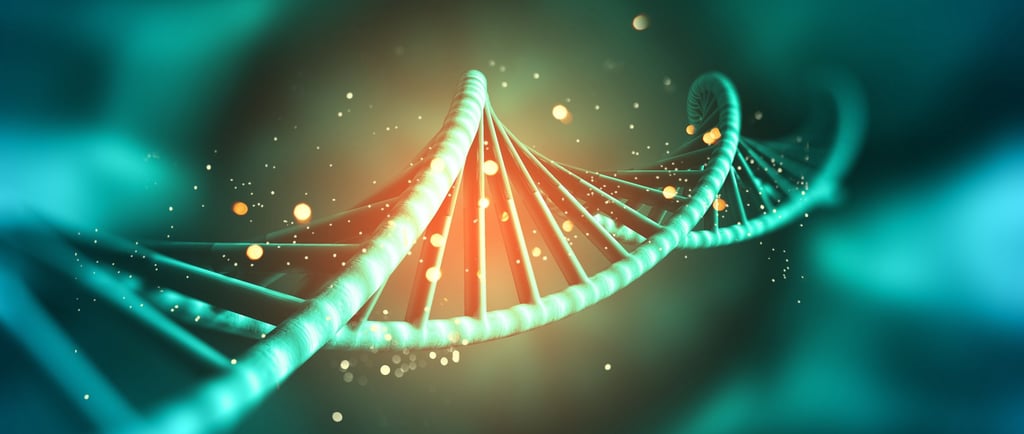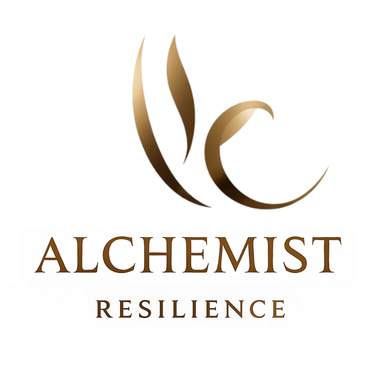Epigenetics - Taking back control of your health
Epigenetics has revolutionized our understanding of life: our genes are not a fixed destiny, but a language that our lifestyle can rewrite.
BODY-MIND BALANCE
Kevin
10/9/20254 min read


For a long time, we believed that our genes determined everything: our health, our talents, our weaknesses, our illnesses. A kind of biological destiny written at birth, immutable and indisputable. But the science of epigenetics has overturned this fatalistic view. It reveals that our genes are not condemnations, but potentialities - a living language that reacts to our environment, our lifestyle, our emotions, and our thoughts.
This discovery opens up an infinite field: that of personal responsibility and biological freedom. We can influence the expression of our genes, activate those that support vitality, joy, and longevity, and deactivate those that promote disease or premature aging. In other words, we have the power to influence our health from within, without necessarily resorting to chemicals.
The natural keys to epigenetic health
There are many simple and powerful natural ways to positively influence our epigenome. They are based on a holistic approach, where each dimension - physical, mental, emotional, and spiritual - influences the others.
Living foods
What we eat sends direct messages to our genes. A diet rich in plants, antioxidants, fiber, essential fatty acids, and micronutrients acts as a veritable “biological language.” Medicinal plants, superfoods, and spices (turmeric, ginger, rosemary, green tea, raw cacao, etc.) help regulate inflammatory and oxidative processes, two major enemies of cellular health.
Conscious physical activity
Moving tells the body that it is alive. Regular physical exercise stimulates the expression of genes linked to muscle regeneration, stress management, and energy production. It is not about performance, but about conscious movement: walking, dancing, yoga, Qi Gong, or simply breathing in the great outdoors.
Sleep and breathing
Deep rest and conscious breathing are two often overlooked pillars of health. Sleep repairs, regenerates, and balances hormones. Slow, regular breathing (as in cardiac coherence) reduces cortisol production and supports genes associated with longevity and inner peace.
Emotions and stress management
Chronic stress, fear, anger, or unexpressed sadness literally alter the body's chemistry. Conversely, gratitude, joy, and love activate cascades of molecules that promote good health. Meditation, visualization, and therapeutic writing are simple tools for restoring this benevolent dialogue between body and mind.
The integrative approach: putting people at the center
Epigenetics invites us to go beyond the simple notion of “treatment” and adopt an integrative approach: relearning how to listen to the body, understand its signals, and become an actor - not a spectator - in our own balance.
This is where coaching comes into its own. The coach accompanies the person through a process of lasting transformation: getting to know oneself better, identifying one's deepest needs, decoding limiting beliefs, and establishing routines that are aligned with one's overall well-being. This is not medical support, but a path to awareness.
Other integrative approaches complete this virtuous circle:
Sophrology and cardiac coherence, to calm the nervous system,
Manual or energy therapies (reflexology, shiatsu, gentle magnetism, reiki), which release memories stored in the body,
Aromatherapy and phytotherapy, which support the organs, regulate emotions, and stimulate natural defenses,
Naturopathy, which supports individuals in maintaining a healthy lifestyle in line with natural physiology.
Personal development and consciousness work, to place health in a broader context: that of meaning.
This holistic approach finally puts people back at the heart of the healing process. It does not conflict with conventional medicine, but rather complements it. Where medicine treats disease, the integrative approach nourishes life.
When science meets wisdom
The latest research confirms what traditional wisdom already knew: the body is an intelligent organism, capable of self-regulation when given the right conditions. Genes “listen” to each other. They respond to our behavior, our environment, and our levels of stress or joy.
For example, some studies show that regular meditation modifies the expression of more than 2,000 genes linked to inflammation and cell repair. Others prove that simply cultivating positive thoughts or practicing gratitude influences the immune system and neural plasticity.
Thus, modern science agrees with ancient wisdom: what we think, feel, and eat literally becomes the stuff we are made of. Our genes are not fixed - they listen to the music of our lifestyle.
The chemical temptation of industry
Faced with this collective awareness, the pharmaceutical industry has not remained indifferent. It is now interested in what it calls “epigenetic modulators”: molecules that are supposed to reproduce, in the laboratory, the effects of natural practices. But can meditation, love, or coherence really be encapsulated in a pill?
These attempts reveal a paradox: the desire to replace the living with the artificial. Certainly, some medical advances can save lives - but they should not distract us from the essential: our power of self-regulation is innate. The future of health lies not only in molecules, but in prevention, awareness, and self-knowledge.
Towards a new vision of health
Epigenetics is not just a scientific discovery: it is a paradigm shift. It puts humans back at the center and reminds us that health is not the absence of disease, but a state of harmony between body, mind, and consciousness. It invites us to become the authors of our own vitality again, to understand that every action counts: what we eat, what we think, what we say, what we believe.
Choosing the natural, integrative, and conscious path means refusing to be passive in the face of a system that medicalizes everything, even life itself. It means restoring the noble meaning of the word prevention: taking care before it's too late.
What if you were the first prescription?
The future of health belongs to those who choose to get involved, to understand, to feel, to love themselves enough to listen to their body's messages. Meditating, breathing, moving, nourishing yourself with light and nature, seeking the support of a coach or therapist, laughing, loving - none of this is “well-being,” it's applied biology.
Our genes listen to us.
And the most beautiful medicine is still the one we write every day with awareness.
Alchemist Resilience
Human resilience, medicinal plants, and mind-body balance.
© Alchemist Resilience 2025. All rights reserved
Email : alchemistresilience@gmail.com
Attentive and confidential response
